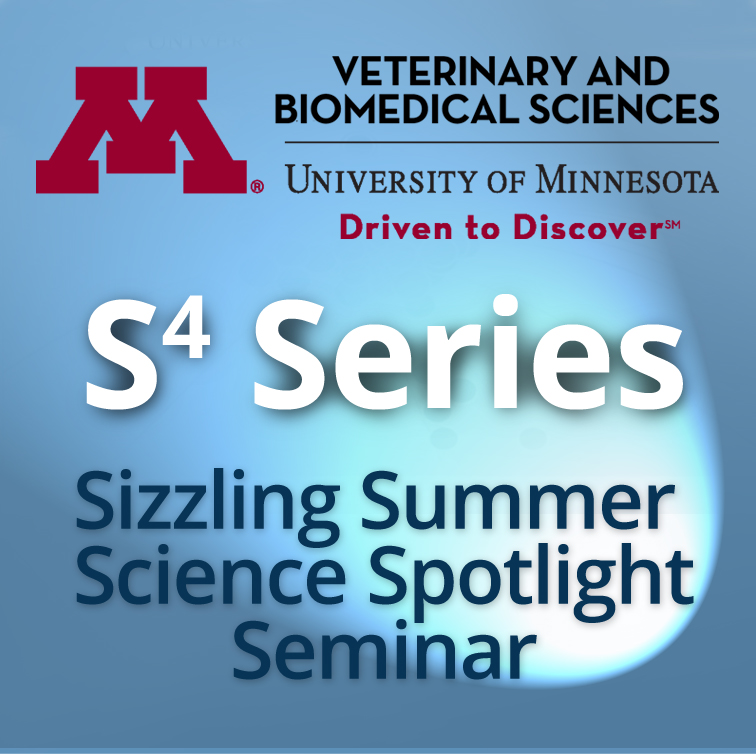Sizzling Summer Science Spotlight (S4) Seminar series, 2022
August 29, 2022

The Department of Veterinary and Biomedical Sciences (VBS) kicked off the 6th Annual Sizzling Summer Science Spotlight (S4) seminar series July 14-August 18, 2022 with six engaging and relevant presenters. This year the seminar was a hybrid format. Some will be offered Thursday mornings and some Thursday afternoons with the option for participants to attend a few seminars in person or all/some via Zoom. To encourage social opportunities and fostering future collaborations or getting to know your colleagues better, a few of the afternoon seminars will be followed by an informal gathering at Como Dock & Paddle at the Pavilion on Como Lake.
 July 14: Dr. Kevin Lang presented, "The impact of Host-Pathogen interactions on genomic integrity," 8:30-9:20am, 215 VSB and Zoom (In-Person option).
July 14: Dr. Kevin Lang presented, "The impact of Host-Pathogen interactions on genomic integrity," 8:30-9:20am, 215 VSB and Zoom (In-Person option).
Summary: VBS Assistant Professor Kevin Lang presented a talk on "The impact of host-pathogen interactions on genomic integrity." Lang discussed how bacteria dominate the Earth and how his research team conducted a mass spectrometry proteomic screen to identify host DNA replication and repair processes important for maintaining genomic integrity during infection of host cells by the food-borne pathogen Listeria monocytogenes. According to Lang, "Genomic integrity is a hallmark of cancer. Our current work is focused on the molecular mechanisms of how host-microbe interactions can impact host genomic integrity. Our future work will include projects looking at how the microbiome affects these processes in the host. These studies have implications for cancer and evolution." Lang added, "In the short term, we hope that our studies will shed light on the potential for food borne infections to drive cancer development. Over a longer term, we hope to reveal mechanisms by which host-microbe interactions drive co-evolution through effects on genomic integrity."
 July 21: Dr. Alonso Guedes (VCS) presented, "First steps towards a new, non-opioid analgesic modality," 3-3:50pm, Zoom only (4:30pm Gathering at Como Dock & Paddle).
July 21: Dr. Alonso Guedes (VCS) presented, "First steps towards a new, non-opioid analgesic modality," 3-3:50pm, Zoom only (4:30pm Gathering at Como Dock & Paddle).

July 28: Dr. Marie Culhane (VPM) presented, "Sharing to learn and learning to share during an animal disease emergency," 8:30-9:20am, 215 VSB and Zoom (In-Person option).
Summary: VPM Professor Marie Culhane presented a talk on "Sharing to learn and learning to share during an animal emergency." Culhane discussed how effective and efficient response to an animal disease outbreak needs the input of stakeholders, especially from producers and regulators. According to Culhane," If you build the relationships that are necessary to sustain a response, you pave the way for reliable information and data exchange. The data can be analyzed in near real-time and provide insights into how to control the current emergency and possibly prevent the next one. " Culhane added, "We hope to target epidemiological investigations to specific date ranges, identify and rule out possible routes of exposure, determine adequate contact rate estimates to inform models used to evaluate active surveillance, and understand how various factors impact the time to [disease] detection." Dr. Culhane is on the Secure Food Systems team, along with her VPM colleagues Dr. Tim Goldsmith and Cesar Corzo and VBS Professor Carol Cardona.

August 4: Dr. Julie Olson presented, "Neuroinflammation: Friend or Foe," 3-3:50pm, Zoom only (4:30pm Gathering at Como Dock & Paddle).

August 11: Dr. Matt Aliota presented, "In the air tonight: SARS-CoV-2 testing in indoor spaces," 8:30-9:20am, 215 VSB and Zoom (In-Person option).
 August 18: Dr. Roberta O'Connor will present, "Anti-parasitic drugs from curious marine creatures and extremophiles," 3-3:50pm, Zoom only (4:30pm Gathering at Como Dock & Paddle).
August 18: Dr. Roberta O'Connor will present, "Anti-parasitic drugs from curious marine creatures and extremophiles," 3-3:50pm, Zoom only (4:30pm Gathering at Como Dock & Paddle).
Summary: Associate Professor Roberta O'Connor presented "Anti-parasitic drugs from curious marine creatures and extremophiles." O'Connor discussed her research on natural products to kill Cryptosporidium, an enteric parasite that is responsible for outbreaks of diarrheal disease worldwide. O'Connor explained, "Cryptosporidium is a ubiquitous zoonotic parasite that infects humans, domesticated animals and wildlife. Currently, there are no effective therapeutics to treat cryptosporidiosis. The long term goal of our work is to identify a safe and effective compound that can be used in veterinary and medical clinics to treat this disease."
Thank you to all who attended in person or virtually!